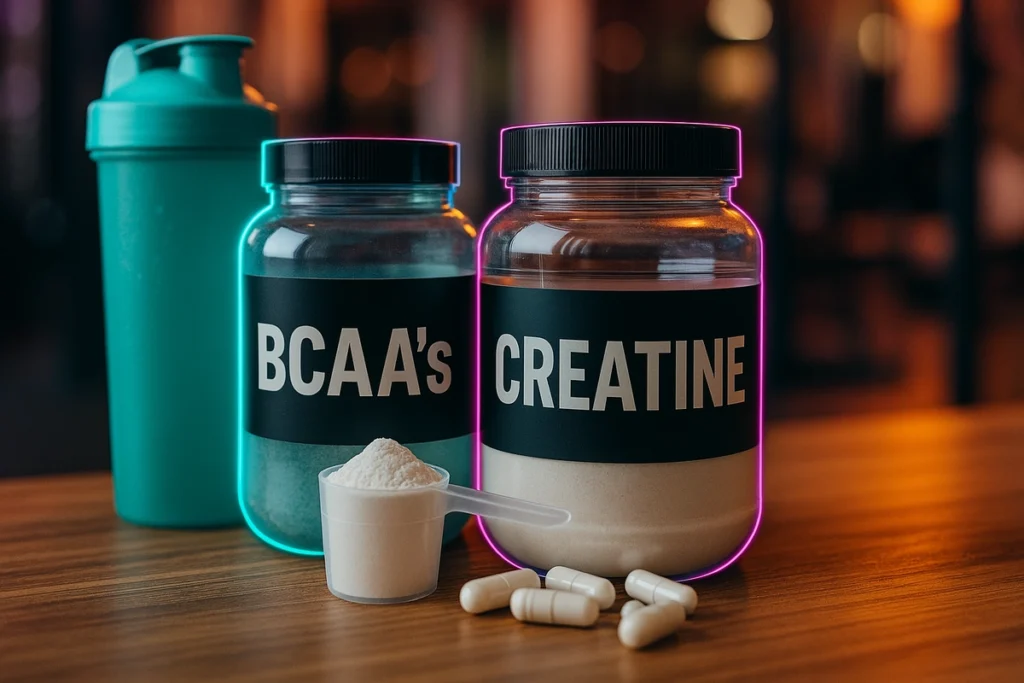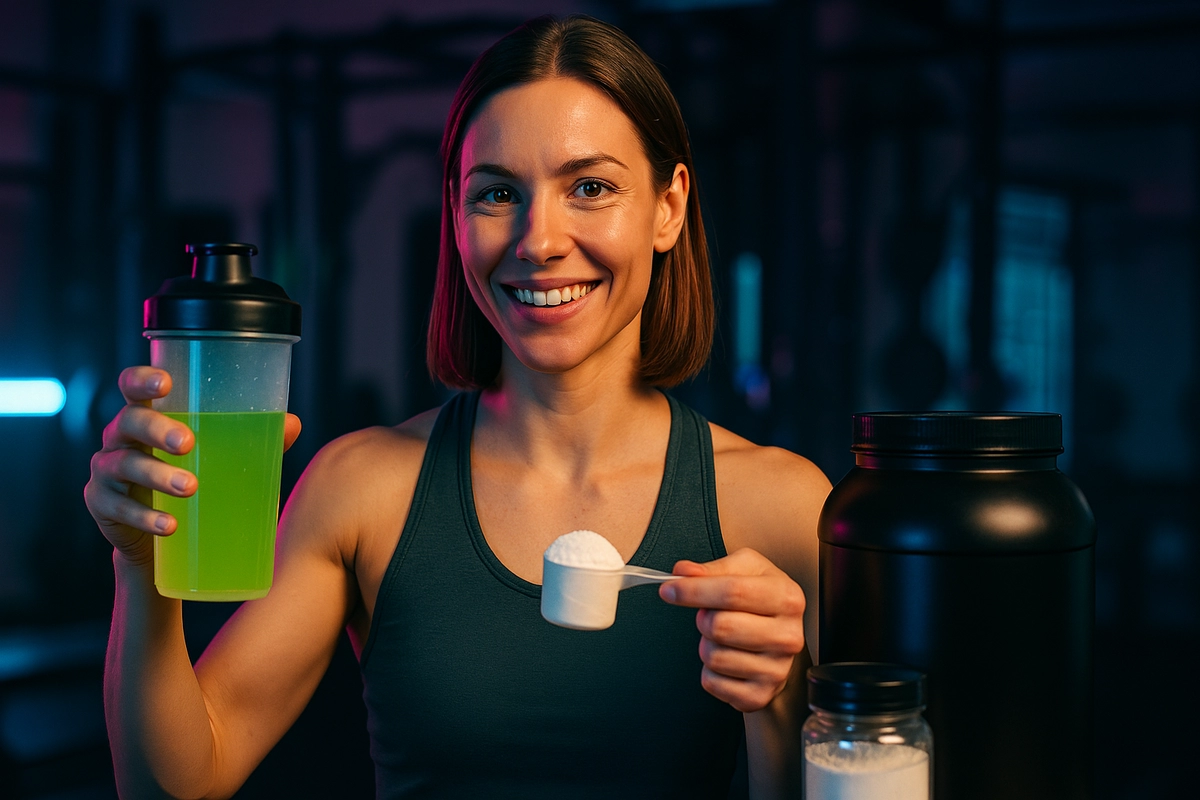If you’ve been hitting the gym consistently and wondering when to take BCAA and creatine for the best results, you’re not alone. I get this question from my clients all the time.
These two supplements are powerhouses for muscle growth, recovery, and performance—but timing them right can make a difference.
So, when’s the best time to take BCAA and creatine? Let’s break it down in a simple, no-BS way.
Table of contents
- Best Time to Take BCAA
- Best Time to Take Creatine
- Can You Take BCAA and Creatine Together?
- BCAA and Creatine – What Do They Actually Do?
- BCAA vs Creatine: Which One Should You Take?
- Potential Side Effects of BCAA and Creatine – What You Should Know
- Common Myths & Mistakes
- Final Verdict: When Should YOU Take BCAA and Creatine?
- FAQs
- Trusted Resources on BCAA and Creatine Timing
Best Time to Take BCAA

- Before Workout – If you train fasted (like morning workouts before breakfast), BCAA can prevent muscle breakdown and help you push through your session.
- During Workout – If you’re doing long, intense sessions (like CrossFit or endurance training), sipping on BCAA keeps your muscles fueled and delays fatigue.
- After Workout – BCAA helps with faster recovery and reducing muscle soreness. Great if you struggle with next-day soreness.
- On Rest Days? – Not a must, but if you’re sore or have gaps in protein intake, you can take it to aid recovery.
My Personal Experience
I’ve experimented with taking BCAA and creatine at different times—before, during, and after my workouts. What worked best for me?
- Creatine: Pre and post-workout both worked great, but post-workout seemed to help better with muscle recovery.
- BCAA: Before and during workouts helped reduce fatigue, while post-workout supported muscle recovery.
From my experience, combining both at the right times can maximize their effects.
Best Time to Take Creatine

- Before Workout? – You can take creatine before, but it doesn’t give an immediate boost like caffeine. It works over time by saturating your muscles.
- After Workout? – This is actually the best time because your body absorbs creatine more efficiently after training. Pair it with a protein shake or carbs for better absorption.
- Anytime? – YES! The most important thing with creatine is daily consistency. It doesn’t matter if you take it morning, noon, or night—as long as you get your 3-5g every day.
- On Rest Days? – Absolutely. Keep taking it daily to maintain muscle saturation.
When I first started using creatine, I stressed too much about timing. But once I focused on just taking it daily, I saw major strength and endurance gains. Bottom line? Take it every day, and don’t overthink it.
Can You Take BCAA and Creatine Together?

YES, you can! These two don’t interfere with each other, and taking them together is actually a solid strategy for muscle recovery and performance.
Best time to take them together?
- Pre-Workout (BCAA + Creatine) – Great for fasted training or endurance workouts.
- Post-Workout (BCAA + Creatine + Protein) – Best for muscle recovery and gains.
- Mix Them Together? – Sure! Just use enough water so it’s not too strong.
Who benefits most? If you lift weights, do CrossFit, HIIT, or endurance sports, stacking BCAA and creatine together is a smart move.
After combining BCAA and creatine, my energy levels spiked, workout intensity improved, and post-workout fatigue reduced significantly. One of the biggest changes I noticed was the reduction of muscle shaking during heavy lifts. Previously, after long sessions, my muscles would tremble due to fatigue, but with this stack, that problem disappeared.
BCAA and Creatine – What Do They Actually Do?

Before we dive into the best time to take them, let’s clear up what each one does:
- BCAA (Branched-Chain Amino Acids): Helps with muscle recovery, endurance, and reducing soreness. BCAAs are especially useful if you train fasted or need extra support during long workouts.
- Creatine: Works by increasing ATP production, which means more power, strength, and muscle gains over time. Unlike BCAA, creatine is about consistent daily intake, not just timing.
When I first started using BCAA and creatine, I noticed a significant increase in muscle mass and a major reduction in workout fatigue. Before supplementing, I would often feel drained halfway through my sessions, but after adding these two, my endurance improved dramatically. My muscles felt fuller, and I could push through intense workouts with less exhaustion.
BCAA vs Creatine: Which One Should You Take?

If your goal is:
- Muscle Recovery & Reducing Soreness → Go with BCAA
- Strength & Muscle Growth → Creatine is your best bet
- Overall Performance & Endurance → Take both for maximum benefits
If you’re on a budget and can only pick one? Go with creatine—it has the most research-backed benefits for strength and performance.
I’ve seen this combination work wonders for my clients. For example, several of them were cutting weight and worried about losing muscle mass. By adding BCAA and creatine, they were able to maintain muscle while burning fat. Another group of clients used this stack to train harder during intense workouts, noticing a clear improvement in endurance and performance.
Potential Side Effects of BCAA and Creatine – What You Should Know

When it comes to BCAA and creatine, most people focus on their benefits—muscle growth, recovery, and performance. But what about side effects? Are they completely safe, or should you be cautious?
As a fitness trainer, I’ve worked with many clients who use these supplements, and while they’re generally safe when used correctly, I’ve seen a few cases where side effects happened—mostly due to incorrect dosage, dehydration, or pre-existing health conditions.
Let’s break it down so you can use BCAA and creatine the right way—without unnecessary risks.
Are BCAA and Creatine Safe?
The short answer? Yes, they are safe for most healthy individuals when taken in the right dosage.
- BCAA is naturally found in protein-rich foods, and its supplementation doesn’t usually cause side effects.
- Creatine is one of the most researched supplements, and studies show that it’s safe for long-term use—if used properly.
But, like anything, misuse can lead to problems.
Possible Side Effects of Creatine (and How to Avoid Them)
Creatine is safe, but it draws water into the muscles, which means not drinking enough water can lead to dehydration, muscle cramps, or bloating.
1. Kidney Concerns – Myth or Reality?
There’s a long-standing debate about whether creatine damages the kidneys. The truth? For healthy people, creatine is NOT harmful to the kidneys.
That being said, I had a client who developed kidney pain after using 20g of creatine per day for two months. When he got tested, his creatinine levels were elevated, meaning his kidneys were under stress from excess creatine buildup.
👉 Lesson learned: Stick to the recommended dose (3-5g per day) and stay hydrated to keep your kidneys healthy. If you have any existing kidney issues, talk to a doctor before using creatine.
2. Hair Loss – Fact or Fiction?
I’ve also noticed that some clients experienced hair thinning after using creatine. While there isn’t strong scientific proof, creatine may increase DHT levels (a hormone linked to hair loss).
If you have a family history of baldness, this might be something to consider.
👉 What to do? If you notice hair loss while using creatine, reduce your intake and monitor any changes.
3. Bloating and Water Retention
Creatine holds water in the muscles, which can make some people feel puffy or bloated—especially in the first week when loading.
👉 Solution? Skip the loading phase and start with 3-5g per day to allow your body to gradually adapt.
Possible Side Effects of BCAA (Are There Any?)
To be honest, I’ve rarely seen anyone experience side effects from BCAA. Since BCAA is just three essential amino acids (leucine, isoleucine, and valine), the body already processes them naturally.
That said, some people report mild nausea or stomach discomfort when taking BCAA on an empty stomach.
👉 Fix? If BCAA upsets your stomach, try mixing it with food or a protein shake instead of taking it alone.
❌ Biggest Mistakes That Cause Side Effects
Most of the side effects from BCAA and creatine come from misuse, not the supplements themselves. Here are the three biggest mistakes I’ve seen:
- Not Drinking Enough Water → Creatine pulls water into the muscles, and if you’re dehydrated, you might feel fatigued, crampy, or bloated.
- Taking Too Much → More does NOT mean better! Stick to 5g of creatine per day and 10-15g of BCAA if needed.
- Ignoring Health Checkups → If you have kidney issues or metabolic disorders, talk to a doctor before using creatine.
How to Minimize Side Effects and Use These Supplements Safely
- Always Drink Enough Water – Aim for 3-4 liters per day, especially if you’re taking creatine.
- Use the Right Dosage – 3-5g of creatine and 10-15g of BCAA is all you need.
- Don’t Overload on Creatine – Skip the loading phase if bloating is an issue.
- Monitor Your Body – If you feel uncomfortable, adjust your intake.
Should You Worry About Side Effects?
If you’re healthy, hydrated, and using the right dose, BCAA and creatine are safe and effective. I’ve used them myself for years, and most of my clients have had nothing but positive results.
Just remember—supplements are tools, not magic. Use them wisely, listen to your body, and stay consistent for the best results.
Common Myths & Mistakes
- “Creatine timing is crucial.” – Nope. Daily consistency is what matters, not the exact time you take it.
- “BCAA is only for bodybuilders.” – Also false! If you do endurance sports, fasted training, or long workouts, BCAA is super helpful.
- “More is better.” – Wrong. 5g of creatine per day is enough. 10-15g of BCAA is ideal depending on training intensity.
I’ve seen a common mistake—mixing creatine with high amounts of caffeine (like coffee or strong pre-workouts). While I’m still researching this myself, some studies suggest that caffeine might reduce creatine absorption, meaning you may not be getting the full benefits of creatine if you’re taking it alongside high doses of caffeine.
Final Verdict: When Should YOU Take BCAA and Creatine?
Best Timing Recap:
- BCAA: Pre, intra, or post-workout for muscle recovery and endurance.
- Creatine: Post-workout or anytime—just take it daily!
- Stacking them together? Yes! Great for maximizing gains.
👉 Pro Tip: Don’t overcomplicate things. Consistency beats perfect timing. Take your creatine daily and use BCAA when it fits your training style.
Now, go crush your workouts! 💪
FAQs
1. Can I take BCAA and creatine on rest days?
Yes! Take creatine daily, and BCAA only if needed for recovery.
2. Should I take BCAA if I already take whey protein?
If your protein intake is solid, you may not need extra BCAA. But if you train fasted or want an intra-workout boost, it helps!
3. Does creatine cause bloating or water retention?
Not in the long run. Any water retention is temporary and only in the muscles (which actually makes you look bigger and stronger!).
4. Can I mix BCAA and creatine with my pre-workout?
Yes! Just check that your pre-workout doesn’t already have creatine to avoid taking too much.
5. How long before a workout should I take BCAA and creatine?
BCAA: 15-30 minutes before or sip during workouts.
Creatine: Timing doesn’t matter, just take it daily.
This guide is built on years of training experience, real-life application, and science-backed facts. Now you know exactly when and how to take BCAA and creatine for the best results!
Have more questions? Drop them below! Let’s keep making gains!
Trusted Resources on BCAA and Creatine Timing
For further reading and to deepen your understanding, here are some reputable sources:
- Healthline: Optimal Timing for Creatine Supplementation
This article delves into research on the best times to take creatine, discussing whether pre- or post-workout consumption yields better results. - PubMed: Effects of BCAA Supplement Timing on Muscle Soreness
A study examining how the timing of BCAA supplementation influences exercise-induced muscle soreness and damage, offering insights into pre- and post-exercise consumption. - Journal of Men’s Health: Impact of BCAA and Creatine on Performance
This research analyzes the effects of BCAA and creatine supplementation on anaerobic capacity and ball-kicking speed in male football players, shedding light on their combined benefits.
These resources offer comprehensive information to help you optimize your BCAA and creatine supplementation strategies.
🩺 Disclaimer: This article is for informational purposes only and not medical advice. Always consult with a healthcare provider before starting any supplement.



Leave a Reply